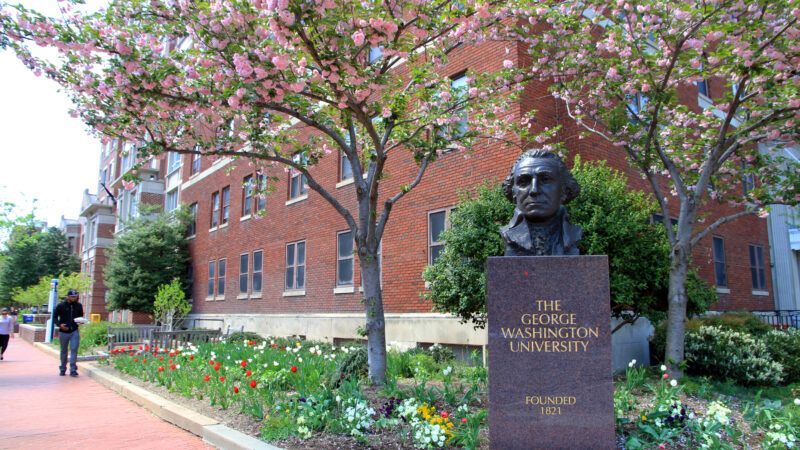George Washington University Backpedals After Agreeing To Investigate Critics of China
"Upon full understanding, I do not view these posters as racist; they are political statements," said university president Mark Wrighton.

One of the most troubling aspects of the Chinese Communist Party's brutal crackdown on free speech is that it doesn't just affect China—it impacts us here in the U.S. as well. That's because many American organizations and people—businesses, athletes, etc.—choose to engage in self-censorship in order to appease the Chinese government. A powerful example was provided by Activision Blizzard, the online gaming company, which punished a professional Hearthstone player for uttering a pro–Hong Kong slogan while being interviewed on a livestream.
A similar thing seemed poised to occur at George Washington University. Art posters recently appeared all over campus that criticized the Chinese government, with reference to the Winter Olympics in Beijing being underway.
2/ The collection posted in @GWtweets includes 5 posters depicting CCP's
1. Oppression of the Tibetans
2. Uyghur genocide
3. The dismantling of HK democracy
4. The regime's omnipresent surveillance systems
5. lack of transparency surrounding the COVID-19 pandemic. pic.twitter.com/ITIBiryf4X— 巴丢草 Bad ї ucao (@badiucao) February 5, 2022
The artist, Badiucao, is a Chinese-Australian dissident journalist whose work protests the Chinese government.
The posters drew criticism from G.W.'s Chinese Cultural Association, which put out the following statement:
As scholars in higher education institutions, we expect the university community to have basic scientific awareness and preserve cultural diversity. This series of posters incites not only intra-ethnic hatred in China but also inter-ethnic hostility and inter-cultural contempt. We believe that George Washington University supports equality and inclusion, and that students at George Washington University are friendly and united. Posters with such hateful messages are not only uncomfortable and provoke ethnic relations within the Chinese student body, but they also provoke friendships between Chinese international students and their peers from around the world. These posters fuel the prejudice and conspiracy theories against China that the world has had since the epidemic, adding fuel to the plight of Chinese students.
The association demanded that G.W. investigate the matter through the Office for Diversity, Equity, and Community Engagement. Perhaps it says something about offices for diversity in general that they are often the first resort of would-be tyrants.
Badiucao fired back, accusing G.W. of launching a "witch-hunt" against student activists.
1/ @GWtweets George Washington University Chinese Students and Scholars Association (GWUCSSA) is launching a witch-hunt to the student activists puting my boycott #beijing2022 posters in campus.
A classic smear campaign to cancel criticism against CCP via calling it "racism". pic.twitter.com/Z7OFIEgWB5
— 巴丢草 Bad ї ucao (@badiucao) February 5, 2022
The university's president, Mark Wrighton, initially responded in precisely the wrong way, saying in a statement that he was personally offended by the posters and would "undertake an effort to determine who is responsible." After receiving plenty of criticism for this statement, and thinking the matter over a bit harder, he reversed and confessed he had responded too hastily. "Upon full understanding, I do not view these posters as racist; they are political statements," he said. "There is no university investigation underway, and the university will not take any action."
The Foundation for Individual Rights in Education (FIRE) is glad that the university backed off, but is nevertheless troubled that Wrighton's initial impulse was to launch an investigation into potentially offensive speech.
"It should have been immediately obvious to G.W.'s administration why attempting to unmask and punish anonymous student critics of China is a terrible idea and, frankly, it's troubling that they needed to be reminded of this fact," said FIRE in a statement. "If the students who posted this artwork were from China or Hong Kong, they and their families could have been placed in real peril if their involvement were investigated—a fate that has awaited other international students who have been uncovered as critics of China at U.S. campuses. Universities nationwide should remember this point."
Indeed they should. No American institution should aid Chinese censors in obscuring the truth about the government's human rights abuses or aid them in hunting down dissidents.
